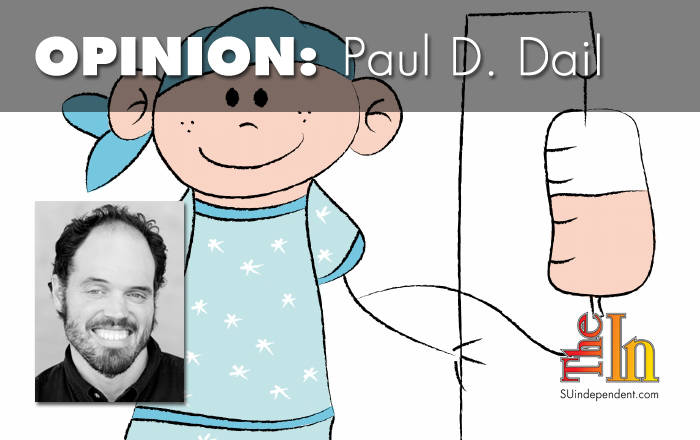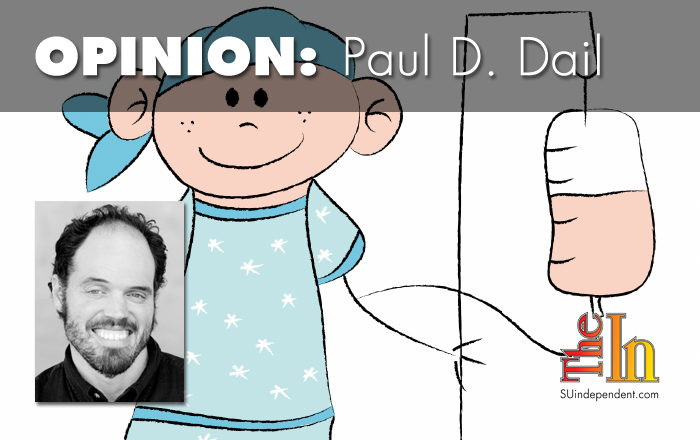 I always believed I would make it out of this life with all my parts intact. After all, I had made it to 40 without having anything more than wisdom teeth removed (and most people lose those, right?) Appendix? Still got it. Tonsils? Check.
I always believed I would make it out of this life with all my parts intact. After all, I had made it to 40 without having anything more than wisdom teeth removed (and most people lose those, right?) Appendix? Still got it. Tonsils? Check.
But as I’m lying in a hospital bed with a 4-inch incision running up my abdomen, unable to take a deep breath without pain, I find myself missing something I never suspected I’d lose. Some of you might be guessing I’m referring to the tumor mentioned in the title of this article.
(Aside #1: I can’t help but thinking of the movie “Kindergarten Cop” with Arnold Schwarzenegger whenever I hear the word “tumor.” Yeah, “Kindergarten Cop.” Weird how the brain works. Anyway, according to my doctor, it was a “too-muh.”)
But it’s the not the tumor I’m talking about. I’m glad that’s gone. It’s my entire left kidney I suddenly find myself lacking.
I should back up a little, and with kidney cancer, I don’t have to go back very far. While it may have seemed like forever waiting for this surgery (and I still have another two weeks until I get the pathology report telling me what happens next), it has only been a month since I first noticed my urine was much darker than normal. Almost brown. Even with hints of red.
(Aside #2: This article will be filled with valuable little tidbits to hopefully help you avoid going through the same thing as I did. Advice like, “Pay attention to your urine.”)
Noticing blood in your urine is pretty disconcerting, especially if you’re something of a hypochondriac. According to the Mayo Clinic, when one has hypochondria/hypochondriasis, he/she becomes obsessed with the idea that they have a serious or life-threatening disease that just hasn’t been diagnosed yet. It doesn’t help that I’m also a horror writer. This means that not only do I worry that I’m going to die, but it’s probably going to be horrific.
The first time I went skydiving, I actually wrote a letter the night before saying goodbye to my friends and family. Obviously not a medical condition, but you get the idea. Maybe the fact I survived that jump only served to convince me that I’ve been on borrowed time ever since. Therefore, every medical condition or exam is certainly a sign that my time has finally come. That first HIV test. The pain I sometimes get in my side that makes it hard to breathe. Any cough lasting more than a few days. Blood tests.
And so on.
But before I go any further, a joke for you: A hypochondriac is at his doctor’s office awaiting test results. The doctor walks in and says, “Well, I have the results, but first I have a joke, a little humor to ease the tension. How do you keep a hypochondriac in suspense?”
“How?” the hypochondriac asks.
The doctor leaves the room.
They say laughter is the best medicine. As for me, I think I’ll call the nurse for a little more of whatever is in that IV.
And, we’re back. Where was I? Oh yes, blood in my urine. Now many of you might ask, “If you’re a hypochondriac, wouldn’t this have you at the doctor’s proverbial doorstep on day one?” Yes and no. I have had two urinary tract infections previously, and if there’s one thing I like less than the idea of dying, it’s paying for a needless doctor visit. So even though I was neither feeling any pain when I went to the bathroom nor having the persistent urge to go more often, I treated myself for a UTI and gave it a week.
(Aside #3: The lack of those two symptoms generally rules out UTIs as well as kidney stones. While blood in your urine doesn’t necessarily mean a tumor — it could be something as simple as a reaction to medication — it is still recommended you get it checked out.)
After a week, I gave in and went to the doctor. He asked about any other symptoms I might have been experiencing.
(Aside #4: Other symptoms of kidney cancer include a lump in your side or abdomen, loss of appetite, persistent fever unrelated to a cold or other infection, extreme fatigue, weight loss for no apparent reason, and pain in the flank or lower back.)
Let me address a few of those. First, I have two children, ages 2 and 4. I’ve been experiencing fatigue for four years now. I had noticed weight loss, but as I’ve been about 10-15 pounds above my optimal weight, I was actually pleased.
When it comes to the pain, maybe it was there, and maybe not. The interesting thing here is, because kidney cancer is most prevalent with men over the age of 40, we don’t tend to necessarily pay attention to the pain. Because we’re officially old (just ask any teenager).
(Aside #5: Kidney cancer is also more prevalent in men than women, and more so in African Americans than Caucasians.)
Comedian Louis C.K. addressed this less clinically: “[The doctors] stop trying to fix shit when you get to be 40. They just go, ‘Yeah, that starts to happen.’”
I may have been feeling pain in my lower back or side, but I also have a 2-year-old who still likes to be carried around. And I’m old. And fighting against my hypochondriac tendencies. If the pain was there, I probably tried to ignore it.
So, the doctor gave me a urinalysis, which showed a “concerning amount of blood cells.” The next step was a CT scan.
(Aside #6: If the doctor suspects cancer at all, make sure to request the CT scan that uses the contrast dye and includes your full chest. The dye gives the specialists better details, and if kidney cancer metastasizes, one of the most common area for it to spread will be the lungs. Bone marrow is the other area.)
Be prepared for this bill. As I joked on my Facebook page, “When I grow up, I want to be a CT scan machine. Apparently, they make about $1,600 for five minutes of work.”
But I wasn’t laughing when my doctor called me with the results. A lesion on my left kidney, approximately the size of a golf ball.
(Aside #7: Medically speaking, the terms “lesion,” “mass,” and “tumor” are used almost interchangeably.)
From here, the news bounces from good to bad. For example, if diagnosed early, the survival rate is anywhere from 79% to 100 %. However, approximately 85% of kidney tumors are malignant (so they won’t bother with a biopsy). While there are some experimental methods of treatment, the most common way of addressing kidney cancer is the surgical removal of either part or all of your kidney, depending on the tumor’s location.
The good news? You only need one kidney, and the complication rate of the various procedures is less than 1%. However, even though there are all sorts of different grades and stages your tumor will receive before they remove it, you won’t know if there’s any really bad news until it’s out and you receive the pathology report (even if there aren’t any signs that the cancer has spread from the kidney). Unfortunately, if the cancer cells are in the bloodstream, the success of follow-up treatment is greatly reduced.
(Aside #8: For some reason, chemotherapy, hormone treatment, and radiation therapy are not effective for kidney cancer.)
The irony of all this? After my initial diagnosis, of course, I went to WebMD (which I have heard jokingly referred to as a great site for convincing yourself you have a terminal illness). While the exact causes of kidney cancer have yet to be determined, certain risk factors seem common to kidney cancer patients. The top one listed? Smoking.
(Aside #9: Other risk factors include obesity and genetic predisposition, but smoking is at the top. For smokers, every day after you quit does indeed make your lungs healthier. Potentially as soon as two weeks after quitting, your lung function starts to improve, and your heart attack risk starts dropping. However, your heart and lungs aren’t the only things affected by smoking. Don’t smoke, kids. And if you already do, it’s time to stop.)
It has been several years since my last cigarette, but I smoked for longer than I care to admit. While I definitely enjoyed most of those cigarettes (as most smokers do, even as they’re telling you they should quit), I knew smoking was a bad idea almost from the first time I started. The hypochondriac in me was convinced that I would get lung cancer.
Life is funny that way.
For now, all I can do is wait two weeks for the pathology report, sans one kidney (and of course, the tumor), and find out what the final aside to this article will be.




